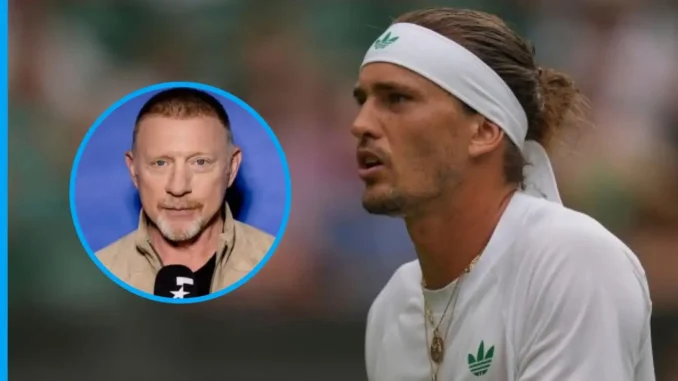
In the high-stakes world of professional tennis, where mental fortitude often separates champions from contenders, German tennis legend Boris Becker has voiced both concern and optimism about his compatriot Alexander Zverev’s recent struggles and aspirations. The six-time Grand Slam champion, known for his candid commentary, recently shared his thoughts on Zverev’s emotional vulnerability following a shocking first-round exit at Wimbledon 2025, while also expressing unwavering belief in the world No. 3’s potential to claim a coveted major title and ascend to the top of the ATP rankings.
Zverev, a 28-year-old prodigy widely regarded as one of the most accomplished players yet to win a Grand Slam, has faced a turbulent 2025 season. Despite reaching the Australian Open final earlier this year, where he fell to world No. 1 Jannik Sinner, Zverev’s form has been inconsistent. His campaign included a quarter-final loss to Novak Djokovic at Roland Garros and a surprising defeat to world No. 72 Arthur Rinderknech at Wimbledon, marking his earliest Grand Slam exit in six years. However, it was Zverev’s post-Wimbledon press conference that drew significant attention, as he laid bare his emotional struggles, admitting to feeling “empty” and “lacking joy” both on and off the court. “I’ve never felt this empty before,” Zverev confessed. “Just lacking joy in everything that I do. It’s not necessarily about tennis. Just lacking joy outside of tennis, as well.”
Becker, who has mentored Zverev informally and refers to him as a “sporting adopted son,” was deeply moved by these remarks. Speaking at an event in Germany, Becker revealed that he was brought to tears watching Zverev’s candid press conference. “I watched the press conference live and I cried,” he shared on the Becker Petkovic podcast. “A person opened up and said, ‘I have problems, I have mental problems, help me. I don’t have anyone around me except my daughter, who is four years old, with whom I like to spend time, where I laugh and smile.’” Becker’s emotional response underscored his concern for Zverev’s well-being, emphasizing that while Zverev’s tennis prowess remains undeniable, his personal struggles could cast a shadow over his career and life beyond the court.
Despite his empathy, Becker questioned the wisdom of Zverev’s public disclosure. “If I had been his coach, I would have advised him not to reveal such insights about his mental state in the Wimbledon press conference,” Becker stated. “Ideally, you don’t open your heart when you are eliminated in the first round of a Grand Slam tournament.” He suggested that such vulnerability, while courageous, might be better addressed privately to avoid adding pressure in an already demanding sport. Becker’s own career, marked by both triumphs and personal challenges, including time served in prison, gives him a unique perspective on the mental resilience required to succeed at the highest level.
Yet, Becker remains steadfast in his belief in Zverev’s potential. “It was perhaps the revelation he needed,” he noted optimistically. “I am convinced that he will win his Grand Slam and that he can become number one at some point.” Becker’s confidence stems from Zverev’s impressive resume, which includes an Olympic gold medal, two ATP Finals titles, and seven Masters 1000 titles. However, he acknowledged the steep challenge ahead, particularly with younger stars like Jannik Sinner and Carlos Alcaraz dominating the sport. “Becoming number one is difficult, but staying number one is the most difficult thing in the world,” Becker added, highlighting the mental and physical demands of maintaining elite status.
Zverev’s recent performances offer a glimmer of hope. After his Wimbledon setback, he took time off in Ibiza to recharge, a move Becker supported, urging him to prioritize personal well-being over immediate tournament commitments. Zverev’s resurgence at the BMW Open in Munich, where he clinched the title on his 28th birthday, and a strong start at the Madrid Open signal a potential turnaround. His work with a revamped team, including a new physiotherapist and hitting partner, alongside guidance from Toni Nadal, has injected fresh energy into his game.
As Zverev prepares for the Canadian Open, the tennis world watches closely. Becker’s dual perspective—concern for Zverev’s mental health and confidence in his Grand Slam potential—paints a complex picture of a player at a crossroads. Can Zverev harness his talent and overcome his inner doubts to claim the elusive major title? With Becker’s mentorship and a renewed focus, Zverev’s journey toward tennis greatness continues to captivate fans and analysts alike, promising a compelling chapter in the sport’s evolving narrative.
Leave a Reply